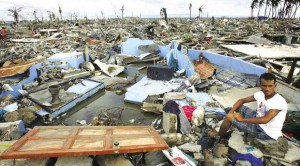MANILA, Philippines – Amid the hundreds of countries and relief organizations helping the Philippines move along the long road to recovery after Super Typhoon Yolanda (international name Haiyan), one relief worker has found the perfect combination of work and passion.
“It’s what they call a ‘perfect combination.’ When you enjoy what you are doing and you are living your passion,” Lara Togonon-De Castro, a Field Coordinator and Urban Planner for Guiuan, Eastern Samar under the United Nations (UN) Human Settlements Program, said in a phone interview with INQUIRER.net.
De Castro, who holds a master’s degree in Urban and Regional Planning at the University of the Philippines Diliman, said that her work with the UN is how she envisions herself contributing to society.
“I went into it with an intention, it followed my general purpose, my general vision of how I want to contribute to society,” she said.
De Castro began work on the relief effort in Eastern Samar within the week after Yolanda hit the country. Before she was rehired for the Yolanda disaster recovery, she has previously worked with UN in 2011 for a year.
Opportunities in development work
Carin van der Hor, country director for international development organization Plan International, said that there are many job opportunities in relief work because of the many grants they are receiving.
“We are getting extra grant funding, we’re expanding, we’re getting more and more funding in order to deliver our programs … so we are able to help more people,” she said in a separate interview.
Plan International has so far hired more than 500 people for its many rehabilitation projects not just in areas devastated by Yolanda but also in Bohol where an earthquake destroyed hundreds of homes and infrastructures.
They are hiring people to be part of projects in water sanitation, child protection, education, training, school rehabilitation, engineers, among others, she said.
Hor said that though most positions are project-based, usually in three to four month contracts, these are subject to extension.
“What we try to do is keep people on board. If they are already in then they can be extend if new funding comes in,” she said.
“We want to be a good employer, when we invest in people, we want to keep them,” Hor said.
Active Engagement of Filipinos
De Castro said that even though international relief and development organizations have brought with them many experts in the field of disaster rehabilitation, the role of Filipinos cannot be discounted.
“The people from these organizations they are the ones who came from Afghanistan, Haiti, Indonesia, Banda Aceh, and they bring with them a huge bag of experience,” De Castro said.
“But at the same time, the challenge for them is how to apply their experiences in the Philippines. They cannot know everything because they are not Filipinos, that’s where the importance of local knowledge comes in,” she said. “There is an exchange of information and exchange of knowledge so that programs can be crafted better.”
De Castro urged Filipinos to be actively engaged in helping with the rehabilitation efforts citing their importance in the exchange of information and experiences that can help the Philippines recover faster.
“Filipinos have to actively engage in this kind of work because we are the ones who know our situation,” she said. “Filipinos should not be passive.”
“They should be actively engaged. The [villages] and local counterparts of international organizations, we have a lot of Filipinos with us and there is a healthy conversation that takes place,” De Castro said. “It’s best that there is a merging of international experience with local knowledge.”
RELATED STORY
Help ‘Yolanda’ victims first before infrastructure–Romualdez
